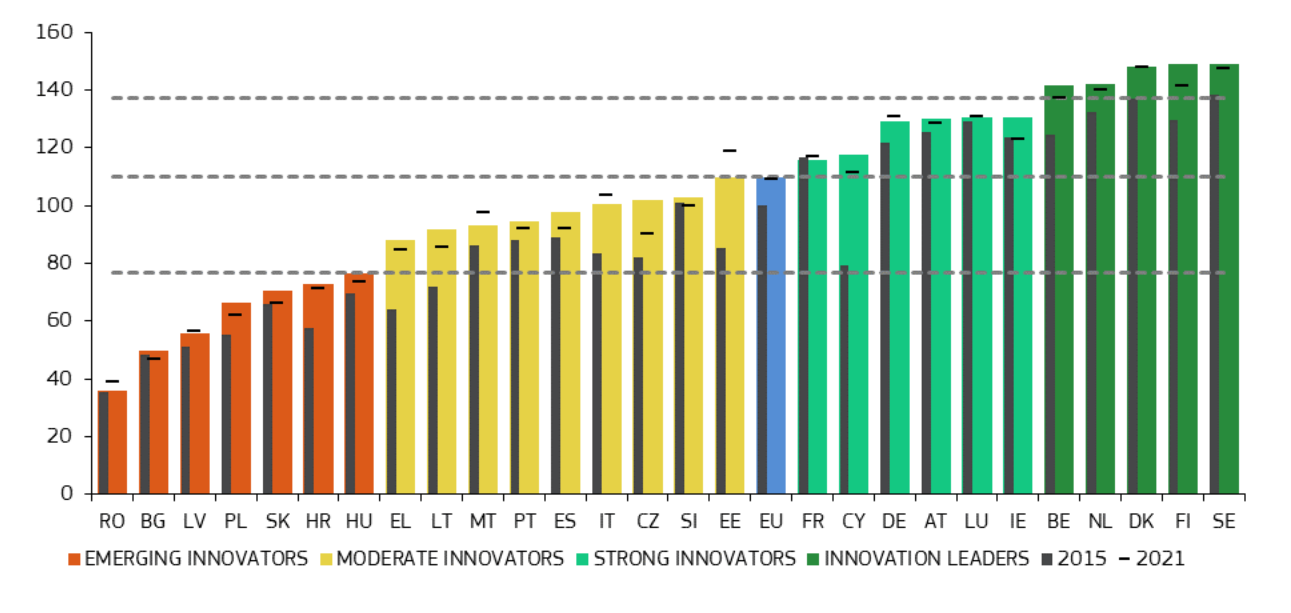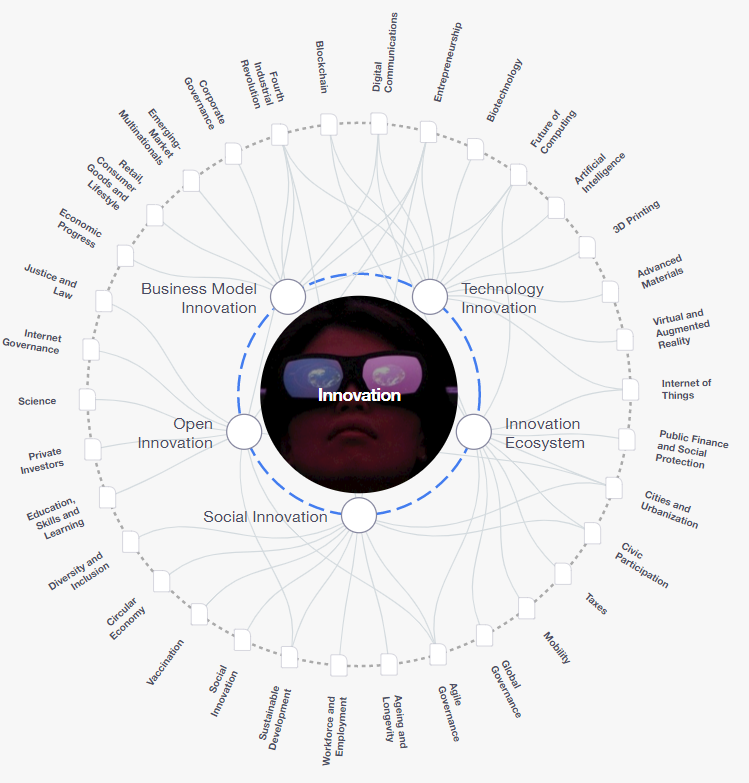Why is Innovation crucial for a better future?
by Prof. Robert Somogyi
In the rapidly evolving landscape of the 21st century, innovation stands as a linchpin for shaping the future. It encompasses the creative and transformative processes that lead to the development of new ideas, technologies, and approaches across various domains. As societies navigate through complex challenges and opportunities, innovation emerges as a key factor, not only for adaptation but also for fostering progress, sustainability, and prosperity.
Innovation is a key driver for the future for several reasons, and its importance is deeply rooted in its transformative impact on various aspects of society, economy, and technology. The world is constantly evolving, and innovation enables individuals, businesses, and societies to adapt to and thrive in the face of change. Technologies and industries that were groundbreaking a few years ago may become obsolete without ongoing innovation.
Innovation drives economic growth by creating new industries, products, and services. It fosters entrepreneurship, job creation, and increased productivity, contributing to the overall expansion of economies. In a globalized world, nations and businesses must stay competitive. Innovation provides a competitive edge by allowing entities to differentiate themselves, stay ahead of rivals, and meet the changing demands of consumers.
Many of the challenges facing humanity, such as climate change, healthcare issues, and resource scarcity, require innovative solutions. Innovation allows for the development of new technologies and approaches to address these challenges. Innovations in fields like healthcare, education, and technology have a direct impact on improving the quality of life for individuals. Breakthroughs in medical treatments, educational tools, and communication technologies enhance the overall well-being of societies.
Innovation often leads to the development of more efficient and productive processes. This can result in cost savings, resource optimization, and increased output, benefiting both businesses and consumers.
Innovation is a driving force behind technological advancements. From the invention of the wheel to the development of artificial intelligence, each innovation has paved the way for new possibilities and advancements that shape the way we live and work.
Innovations in communication and transportation have facilitated global connectivity. This interconnectedness allows for the rapid spread of ideas, collaboration on an international scale, and the sharing of knowledge, fostering a more globalized and collaborative world.
Emerging industries and technologies often create new job opportunities. While some traditional jobs may be replaced, innovation generally leads to the creation of new roles and skill demands, driving employment in evolving sectors. Societies that embrace innovation tend to be more resilient in the face of challenges. Whether dealing with economic downturns, natural disasters, or public health crises, innovative solutions can contribute to more effective responses and recovery.
Innovation is a key driver for the future because it enables adaptation, fosters economic growth, addresses global challenges, improves quality of life, drives technological progress, and enhances overall resilience in a rapidly changing world. Embracing and promoting a culture of innovation is essential for ensuring a prosperous and sustainable future.

To improve start-up ecosystems worldwide and promote innovation, consider the following strategies:
- Access to Funding: Ensure that start-ups have access to funding through a variety of sources, including venture capital, angel investors, and government grants. Financial support is crucial for research, development, and scaling operations.
- Education and Skills Development: Foster a culture of innovation through education and skills development. Encourage STEM (Science, Technology, Engineering, and Mathematics) education and provide training programs for aspiring entrepreneurs.
- Regulatory Support: Create a regulatory environment that encourages innovation and entrepreneurship. Simplify bureaucratic processes, provide tax incentives, and establish supportive policies that facilitate the growth of start-ups.
- Networking Opportunities: Build strong networks and communities where entrepreneurs, investors, and industry experts can connect and collaborate. Networking events, conferences, and co-working spaces play a crucial role in fostering innovation.
- Incubators and Accelerators: Establish and support incubators and accelerators that provide start-ups with mentorship, resources, and a conducive environment for growth. These programs can help shorten the learning curve and increase the chances of success.
- Public-Private Partnerships: Encourage collaboration between the public and private sectors. Governments can work with businesses to create initiatives that support innovation, such as joint research projects and innovation hubs.
- Global Collaboration: Facilitate international collaboration to share knowledge, expertise, and resources. Global partnerships can accelerate innovation by bringing together diverse perspectives and talents.
- Risk-Taking Culture: Foster a culture that embraces risk and failure as part of the innovation process. Encourage a mindset that sees setbacks as opportunities to learn and improve.
By implementing these strategies, countries and regions can create a conducive environment for start-ups to thrive, leading to increased innovation and contributing to a more prosperous and sustainable future.
But where are the best hotspots and environments for this kind of culture? Where can innovations really grow?

Sweden is the most innovative member state of the European Union. Image: EU

The most innovative countries in the EU are in Northern and Western Europe. Image: EU
Innovation hotspots and environments that foster a culture of creativity, entrepreneurship, and technological advancement often cluster in specific regions known for their vibrant ecosystems. These hotspots provide an intersection of various elements such as world-class universities, research institutions, a concentration of skilled talent, access to funding, supportive government policies, and a collaborative network of entrepreneurs and mentors. Here are some of the most renowned innovation hotspots globally:
- Silicon Valley, USA: Silicon Valley, located in the southern part of the San Francisco Bay Area, is perhaps the most iconic innovation hotspot in the world. It's home to a dense concentration of tech giants, venture capital firms, and start-ups, all contributing to a culture of innovation and risk-taking.
- Boston/Cambridge, USA: Often referred to as "The Hub" or "BioTech Bay," the Boston and Cambridge area is known for its concentration of world-class universities, research institutions, and a strong emphasis on biotechnology, healthcare, and technology innovation.
- Tel Aviv, Israel: Tel Aviv has emerged as a major innovation hub, particularly in the fields of cybersecurity, medical technology, and agricultural innovation. Israel's start-up ecosystem, often referred to as the "Start-up Nation," is known for its entrepreneurial spirit and government support.
- Shenzhen, China: Shenzhen has transformed into a global innovation hub, especially in electronics and technology manufacturing. It's home to numerous hardware and tech companies, and its proximity to Hong Kong provides access to international markets.
- Seoul, South Korea: Seoul has a dynamic start-up scene and is particularly strong in technology, gaming, and electronics. It benefits from a tech-savvy population, strong government support, and a robust infrastructure.
- Berlin, Germany: Berlin has become a thriving hub for technology and start-ups in Europe. It attracts entrepreneurs and innovators with its affordable living costs, vibrant cultural scene, and a growing number of tech companies.
- Bangalore, India: Known as the "Silicon Valley of India," Bangalore is a major technology and innovation hub. It has a strong IT sector, a large pool of engineering talent, and a growing number of start-ups.
- Stockholm, Sweden: Stockholm is a hotspot for innovation, particularly in areas such as clean technology, gaming, and life sciences. It benefits from a supportive government, a well-educated workforce, and a high quality of life.
- Singapore: Singapore has positioned itself as a hub for innovation in Asia, with a focus on smart cities, fintech, and biotechnology. Its strategic location, excellent infrastructure, and government support contribute to its attractiveness.
- Eindhoven, Netherlands: Eindhoven, often referred to as the "Brainport" region, is known for its innovation in technology and design. It has a strong emphasis on high-tech industries, including electronics and automotive.
These locations showcase the diversity of innovation hotspots globally, each with its unique strengths and focus areas. It's worth noting that the landscape is continually evolving, and new hotspots may emerge over time as global trends and priorities shift.

Innovation is the process of turning new ideas into value. Image: World Economic Forum.
Let me summarize the overview of innovation!
The Dynamic Nature of Innovation
Innovation is inherently dynamic, reflecting an ongoing process of discovery, experimentation, and adaptation. It spans multiple dimensions, from technological breakthroughs and scientific advancements to social, economic, and organizational innovations. Technological innovation, in particular, has been a driving force, with breakthroughs such as artificial intelligence, biotechnology, and renewable energy reshaping industries and daily life.
Economic Growth and Competitiveness
At the heart of the innovation paradigm lies its profound impact on economic growth and competitiveness. Nations and economies that prioritize and invest in innovation create environments conducive to entrepreneurship, research, and development. Silicon Valley in the United States serves as an epitome of such an ecosystem, where a concentration of tech giants, venture capital, and start-ups fuels economic dynamism and global competitiveness.
Solving Global Challenges
The future is rife with complex global challenges ranging from climate change and healthcare crises to poverty and resource depletion. Innovation emerges as a beacon of hope, offering solutions to these challenges. Clean and renewable energy technologies address environmental concerns, while advancements in healthcare and biotechnology hold the promise of curing diseases and enhancing the quality of life.
Social Innovation and Inclusive Progress
Innovation is not solely confined to technological realms; it extends to social innovation aimed at addressing societal issues and fostering inclusive progress. Initiatives such as microfinance, social enterprises, and educational innovations play pivotal roles in reducing inequality, improving access to resources, and empowering marginalized communities.
Education and Knowledge Economy
Innovation is intricately tied to education, forming the backbone of a knowledge economy. Educational innovations, such as online learning platforms, adaptive technologies, and experiential learning approaches, reshape how knowledge is acquired and disseminated. As the nature of work evolves, lifelong learning and adaptability become essential, and innovation in education becomes a key driver of individual and societal success.
Global Connectivity and Collaboration
The interconnectedness of the modern world has been greatly facilitated by innovations in communication and transportation. The ease of global connectivity allows for collaborative efforts, where diverse perspectives and talents converge to solve problems and drive progress. International collaborations in science, technology, and business exemplify the power of shared innovation in shaping a collective future.
Challenges and Ethical Considerations
While innovation brings forth unprecedented opportunities, it also presents challenges and ethical considerations. Issues related to privacy, cybersecurity, and the ethical use of technologies like artificial intelligence require careful consideration. Striking a balance between innovation and ethical principles becomes imperative to ensure that progress is sustainable and benefits humanity as a whole.
Innovation stands as the key factor of the future, influencing every facet of human existence. Its impact extends beyond technological advancements to encompass social, economic, and environmental dimensions. As societies navigate an increasingly complex and interconnected world, embracing a culture of innovation becomes not only a strategic imperative but also a moral responsibility. Nurturing creativity, supporting research and development, and fostering collaborative ecosystems are essential steps toward harnessing the transformative power of innovation for a future that is sustainable, inclusive, and marked by continuous progress.